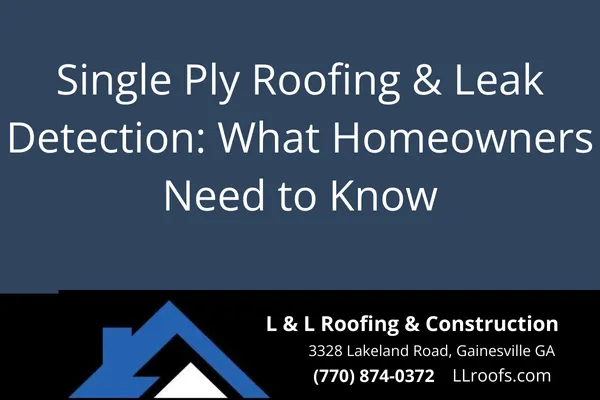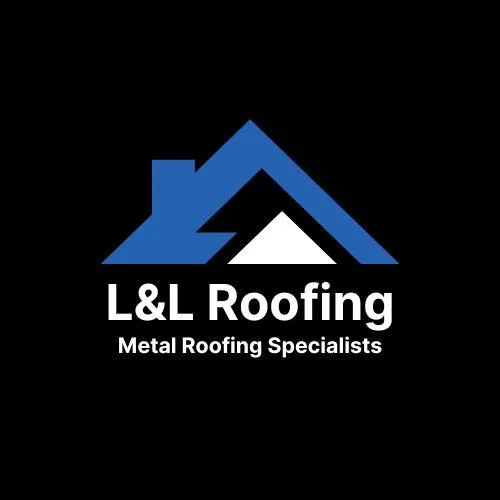
Single Ply Roofing & Leak Detection: What Homeowners Need to Know
Single Ply Roofing & Leak Detection: What Homeowners Need to Know
Single ply roofing systems are a go-to solution for many low-slope residential and commercial roofs around Gainesville, Georgia—and for good reason. But when leaks do happen, detection can get tricky without the right approach.
Let’s break down what single ply roofing is, how leaks are found, and why professional installation and maintenance matter.
What Is Single Ply Roofing?
Single ply roofing refers to a category of roofing membranes made from flexible synthetic materials—mainly TPO (Thermoplastic Polyolefin), PVC (Polyvinyl Chloride), and EPDM (Ethylene Propylene Diene Monomer). These systems are installed in large sheets or rolls, either mechanically fastened, fully adhered, or ballasted over a roof deck.
Why It’s Popular:
Cost-effective for large areas
Fast to install
Durable under UV and weather exposure
Low maintenance when properly installed
At L&L Roofing & Construction, we often recommend TPO roofing for commercial clients in places like Gainesville, Flowery Branch, and Dawsonville thanks to its balance of performance and affordability.
The Challenge: Leak Detection in Single Ply Roofs
Unlike shingle or metal roofs, leaks in single ply systems don’t always show up where you’d expect. Water can travel between the membrane and insulation, making pinpointing the problem harder without specialized tools.
Common Causes of Leaks:
Punctures from foot traffic or debris
Improperly sealed seams
Flashing failure at penetrations or curbs
Shrinkage around perimeter edges
Storm damage or hail impacts
How Professionals Detect Leaks in Single Ply Roofs
At L&L Roofing, we use a combination of visual inspection, electronic testing, and infrared thermal scanning—depending on the situation.
Key Methods:
Visual Checks: Examining seams, flashings, and penetration details for obvious failure points.
Flood Testing: Controlled water testing (less common on occupied buildings).
Electronic Leak Detection (ELD): Uses low voltage or high voltage equipment to trace leaks under the membrane.
Infrared Thermography: Detects moisture trapped under the membrane due to its temperature difference from dry areas.
Not every contractor in Gainesville offers leak detection at this level. But for us, it’s part of ensuring you get the right repair the first time.
When to Call a Roofing Expert
If you’ve noticed staining, pooling water, or musty smells near your flat or low-slope roof, it’s time to call in a pro. Early leak detection is key to preventing:
Rotted decking
Mold in insulation
Damaged electrical systems
Disrupted business operations
We’ve handled commercial roof repairs from Cumming to Buford, and time and again, early intervention saves property owners thousands.
Preventing Leaks with Proper Installation & Maintenance
The best leak is the one that never happens. Here’s how we help Gainesville-area clients avoid issues:
Certified TPO/PVC/EPDM installation
Proper slope and drainage planning
Annual inspections and membrane cleaning
Fast response to storm or hail damage
You don’t have to guess if your roof is performing the way it should. Let our team give you peace of mind.
FAQs
How long does a single ply roof last?
With proper installation and maintenance, TPO and PVC roofs can last 20–30 years. EPDM can often exceed that with care.
Is single ply roofing good for homes?
It’s ideal for low-slope or flat sections of residential roofs, especially over porches, garages, or additions.
What’s the cost to repair a single ply roof leak?
It depends on access, membrane type, and leak location—but timely repairs are always more affordable than structural water damage.
Need leak detection or a flat roof expert you can trust?
Call L&L Roofing & Construction at (770) 874-0372 for an honest assessment and quality service.
We serve Gainesville, GA and surrounding communities with integrity and craftsmanship that last.

